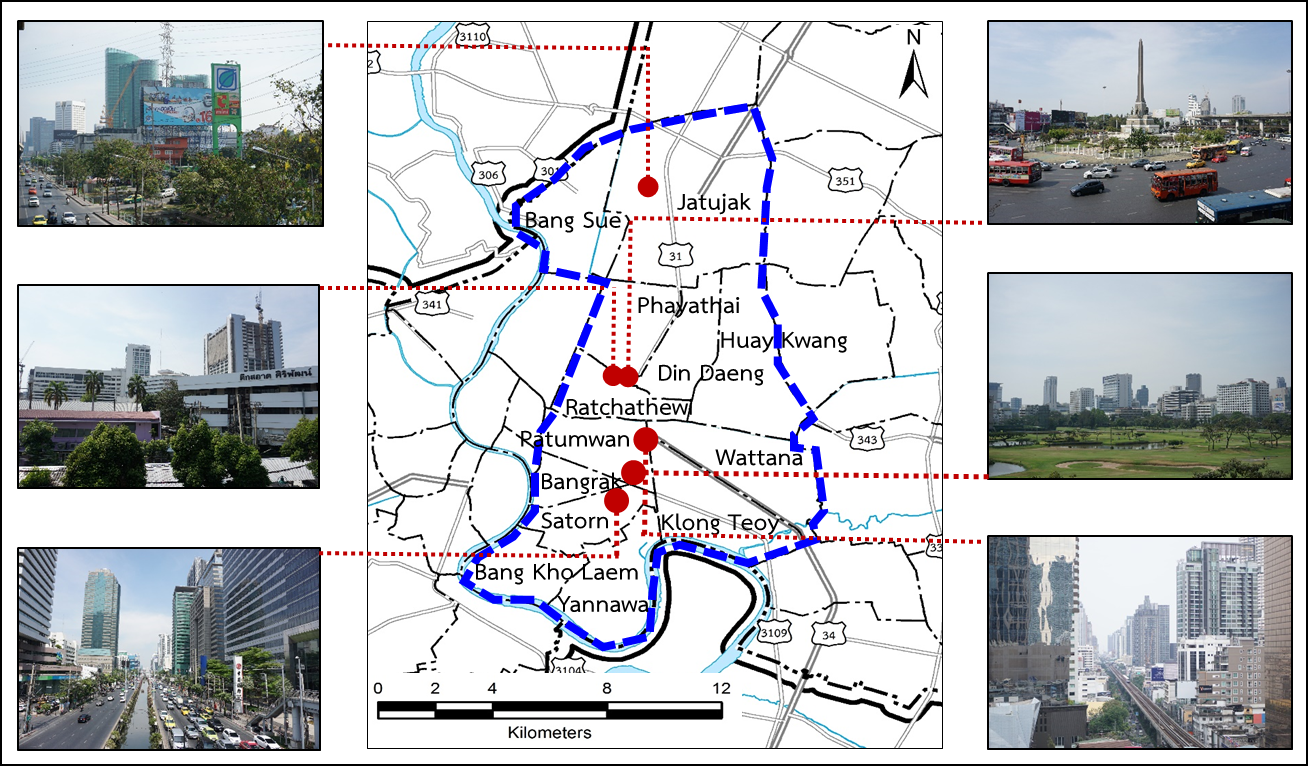Public Opinions of Residents in Bangkok’s Central Business District Towards Environmental Management in the Bangkok Comprehensive Plan of 2013
Main Article Content
Abstract
The objectives of this research article are as follows: 1) to study land use regulations with respect to environmental management under the Bangkok Comprehensive Plan of 2013, and 2) to study people’s opinions about environmental management policies stipulated in the Bangkok Comprehensive Plan of 2013. Results from analysis of the main points in the comprehensive plan and a questionnaire show that although some aspects of the plan promote economic development in the Bangkok’s central business district, the environmental management regulations concerning this area are only stated in the land use zoning plan, the open space plan, the transportation plan, and the public utility plan. Consequently, the people surveyed were found to be most satisfied with the flood and water management strategy. However, more than 70% of respondents did not know about the biotope area factor (BAF) and floor area ratio bonus (FAR Bonus). This could be due to the plan not being achieved in practice. Guidelines for preparations for the Bangkok Comprehensive Plan in the future, besides having more strict penalties and incentives, as some have recommended, should include, people affected being informed about urban planning measures in an extensive and simple way.
Downloads
Article Details

This work is licensed under a Creative Commons Attribution-NonCommercial-NoDerivatives 4.0 International License.
All material is licensed under the terms of the Creative Commons Attribution 4.0 International (CC-BY-NC-ND 4.0) License, unless otherwise stated. As such, authors are free to share, copy, and redistribute the material in any medium or format. The authors must give appropriate credit, provide a link to the license, and indicate if changes were made. The authors may do so in any reasonable manner, but not in any way that suggests the licensor endorses you or your use. The authors may not use the material for commercial purposes. If the authors remix, transform, or build upon the material, they may not distribute the modified material, unless permission is obtained from JARS. Final, accepted versions of the paper may be posted on third party repositories, provided appropriate acknowledgement to the original source is clearly noted.
References
American Planning Association. (2007). Planning and urban design standards student edition. New Jersey: John Wiley and Son.
Bangmo, S. (1995). Organization and management. Bangkok: Wittayapat.
Chula Unisearch, Chulalongkorn University. (2004). Principles of urban planning and urban planning in foreign countries case study: United States. Bangkok: n.p.
Chula Unisearch, Chulalongkorn University. (2004). Principles of town planning and urban planning in foreign countries Case study: United Kingdom. Bangkok: n.p.
Department of City Planning, Bangkok. (2013). Conclusion of Bangkok comprehensive plan of 2013. Bangkok: n.p.
Department of Public Works and Town and Country Planning. (2006). Standards of comprehensive plan 2006. Bangkok: Chulalongkorn University Printing House.
Horayangkura, V. (2017). Guidelines for the development of urban design through fulfilling professional role.Journal of Architectural/Planning Research and Studies (JARS), 14(2), 1-11.
Kom Chad Luek. (2012). Problems of urban people! air pollution. Retrieved March 10, 2017 from http://www.komchadluek.net/news/edu-health/147205.
Office of the Royal Society. (2011). Royal Institute Dictionary 2011. Retrieved March 15, 2017 from http://www.royin.go.th/dictionary/.
Sakon Nakhon Provincial Cultural Office. (2009). Service satisfaction assessment. Sakon Nakhon: Sakon Nakhon Provincial Office.
Strategy and Evaluation Department, Bangkok. (2015). Bangkok statistics 2014. Bangkok: National Office of Buddhism Press.
Surintraboon, C. (2552). Evolution of settlement in Thailand. Teaching document of Course UP 205, Bangkok: n.p.Tapananont, N. (n.d.). Urban and regional planning. Teaching document of course 2503515, Bangkok: n.p.
Tarasawaspat, C. (2004). Basic environmental management. Bangkok: Mac Publishing House.
Tyler, M. G. (2002). Living in the environment: Principles, connections, and solutions, 12th ed. The United States of America: Thomson Learning, Inc.
Worawut, R. (2005). Satisfaction towards work of government officers, Office of the Higher Education Commission. Bangkok: Faculty of Politic Science.
Wongrat, S. (2006). Legal measures for new urban development. Thesis Master of Laws. Faculty of Law, Chulalongkorn University, Bangkok.


